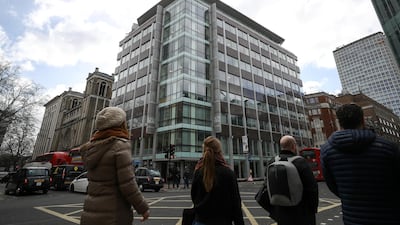The academic at the centre of the dispute over the alleged misuse of Facebook data said Wednesday that he been made a scapegoat and claimed he had no idea the information was aimed at influencing the 2016 US presidential election.
Psychologist Dr Aleksandr Kogan has been accused by Facebook of lying and barred from the social network after developing a personality profiling app that was downloaded by 270,000 people and the data passed to the under-fire political and retail consultancy Cambridge Analytica (CA).
CA’s senior team were caught on secretly recorded footage boasting about influencing the outcome of the election in favour of Donald Trump, whose campaign employed the British company. CA suspended its chief executive Alexander Nix on Tuesday after he was recorded saying they could entrap politicians using women and bribes. The company denies using those tactics and says it did not use Facebook data for the Trump campaign.
The case has highlighted privacy concerns with users of social media unwittingly providing material that can be exploited by campaign teams able to pay for psychological analysis to target voters.
Dr Kogan – who also went by the name of Dr Spectre - claimed that he had done nothing wrong and had believed assurances by CA that he had not broken any Facebook rules.
_______________
Read more:
Facebook hit by allegations its data was used for politics
UK authorities seek warrant to access Cambridge Analytica offices
Cambridge Analytica CEO filmed boasting about entrapping politicians with bribes and sex workers
_______________
He said that CA had paid up to $800,000 to his company to run the app but said that he had not personally benefited and was interested only in using the data for his own research.
“I am honestly stunned by most of this. My view is that I’m basically being used as a scapegoat by both Facebook and Cambridge Analytica,” Dr Kogan told the BBC. “We felt we were acting perfectly appropriately and we thought we were doing something totally normal.”
Dr Kogan remains in post at Cambridge University. The university said on Tuesday that it took matters of “research integrity and data protection extremely seriously” and was seeking evidence from Facebook following its criticisms of the academic.

It said that Dr Kogan had not used Cambridge University facilities to work on the project and the survey was carried out through his own business Global Science Research Ltd.
The company’s filings, however, show links to Cambridge University. He set up Global Science (UK) in March 2014 citing Magdalene College, of Cambridge University, as his residence in company formation documents. His co-founder Brent Clickard listed his address as the Cambridge Department of Experiment Psychology at the university.
The company was one of three shareholders when Dr Kogan and another director Joseph Chancellor registered Global Science Research two months later, the business used to develop the app that harvested the Facebook data.
Mr Chancellor still works as a researcher at Facebook’s Menlo Park headquarters in California, where psychologists conduct research use company data on more than two billion users, The Guardian reported.
Global Science Research continued operating until October 31, 2017. He registered as Dr Spectre as a sole director of another company, Philometrics Ltd, on October 13, 2017, Companies House records show.
Dr Kogan has not responded to questions from the National sent to his academic or work emails. He claimed that the personality test secured only limited data and played down the significance of the data to influence the outcome of any election.
“I think what Cambridge Analytica has tried to sell is magic, and they’ve made claims that this is incredibly accurate and it tells you everything there is to tell about you,” he said. “But I think the reality is it’s not that.”
He said that users who downloaded the app were each paid a few dollars but they also secured information on their friends, depending on the level of their privacy settings.
Mr Kogan said that he passed over the profiles of some 30 million Americans to Cambridge Analytica. His comments followed claims by a whistleblower at the weekend that the company received 50 million users’ data from the research by Dr Kogan.
“My understanding was we were completely within the limits and rights of the agreements that we had,” said Dr Kogan.
Dr Kogan’s failure to question CA about its planned use of the data raised questions among other researchers.
“I don’t think it would be ethical for me to run a consulting business to get around ethics rules so I can forward people’s personal data to another corporation,” said cognitive scientist Stephan Lewandowsky, of the UK’s Bristol University. “That to me sounds very dodgy.”

